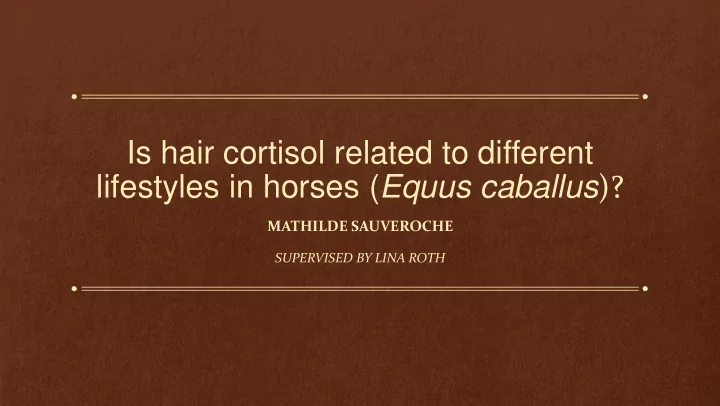

Is hair cortisol related to different lifestyles in horses ( Equus caballus )? MATHILDE SAUVEROCHE SUPERVISED BY LINA ROTH
Introduction – Horse Behaviour • Domestication: 6000 years ago • “Natural” behaviours in horses: • Social: Group living • Grazing ++ • Walking ++ • Management ➔ Affects behaviour
Introduction – Time budgets in different lifestyles Eat / Stand / Lie / Other FREE RANGING INDIVIDUAL STABLES 5% 10% 15% 15% 10% 20% 60% 65% McGreevy, P. (2004). Equine behavior: a guide for veterinarians and equine scientists . Saunders, An Imprint of Elsevier Limited.
Introduction – Cortisol & Stress • Hypothalamic-pituitary-adrenocortical axis = Hormonal pathway involved in stress response • BUT also involved in other processes
Introduction – Cortisol & Stress • Cortisol measure of stress in research • How? • Blood plasma • Saliva • Faeces • Urine • Milk ➢ Non- invasive • Hair ➢ Long term ➢ Validated in many species
Aims • Optimize a method to measure cortisol in horse hair • Investigate if different lifestyles and management regimes influence behaviour and/or hair cortisol levels • Analyse if personality influences hair cortisol concentrations
➢ Free Roaming 153 horses, 3 lifestyle groups: ➢ Riding School Methods ➢ Trotter Racing Hair cutting Behaviour observations
Methods Laboratory analyses Questionnaires: Personality & Lifestyle
Mane Hair cortisol (pg/mg) Results - Cortisol • Cortisol from both body locations: • Sign. positively correlated • Not significantly different ➔ Validates method Withers Hair Cortisol (pg/mg) ➔ In future: pluck mane 14 Mean Mane Hair 12 Cortisol (pg/mg) * 10 • Free roaming lifestyle group has 8 higher cortisol levels than riding 6 school group 4 N=32 N=82 N=28 ➔ No causation can be determined 2 0 Free Roaming Riding School Trotter racing
Results - Behaviour • No stereotypical behaviours observed ➔ No adverse management conditions • Differences in behaviour ➔ Enclosure size?
Results - Behaviour • No significant correlations between cortisol and behaviours ➔ Few data points, behaviour analysed in groups
Results - Personality Dominance, anxiousness and excitability: • Significantly negatively correlated to cortisol levels • Significantly positively correlated with each other ➔ Anxiety also negatively correlated with hair cortisol in humans ➔ Bias in assessment ?
Results - Hierarchy • Rank score given in questionnaire • No sign. Differences in hair cortisol found between low and high ranked horses ➔ Human bias ?
14 Results - Management Mean Mane HC (pg/mg) 12 10 • No sign. Differences found with 8 time spent outdoors 6 4 2 0 Out <8h per day Out > 18h per day 10 • Intensity of training did not 9 Mean Mane HC (pg/mg) 8 affect cortisol concentrations 7 6 5 4 3 ➔ More activity related 2 1 information needed 0 <7h training/week >7h training/week
Conclusions • Method validated & optimized • Low overall cortisol • No causation for difference in cortisol between lifestyles • Contradictive results but supported by other studies Horses show decrease in glucocorticoids when in: • Chronic stress • Chronic pain • Compromised welfare
Recommend
More recommend